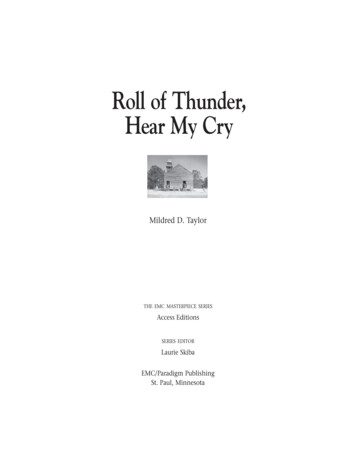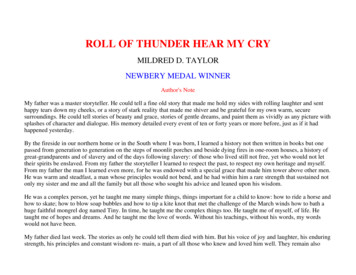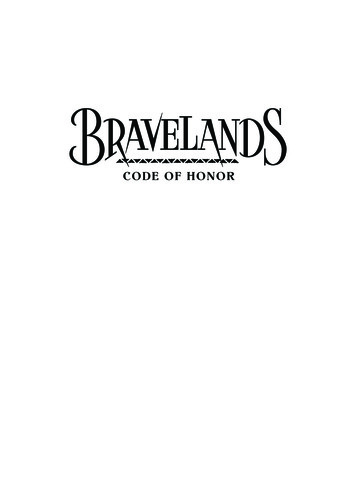
Transcription
Roll of Thunder,Hear My CryMildred D. TaylorTHE EMC MASTERPIECE SERIESAccess EditionsSERIES EDITORLaurie SkibaEMC/Paradigm PublishingSt. Paul, Minnesota
Chapter One“Little Man, would you come on? You keep it up andyou’re gonna make us late.”My youngest brother paid no attention to me. Graspingmore firmly his newspaper-wrapped notebook and his tincan lunch of cornbread and oil sausages, he continued toconcentrate on the dusty road. He lagged several feet behindmy other brothers, Stacey and Christopher-John, and me,attempting to keep the rusty Mississippi dust from swellingwith each step and drifting back upon his shiny black shoesand the cuffs of his corduroy pants by lifting each foot highbefore setting it gently down again. Always meticulouslyneat, six-year-old Little Man never allowed dirt or tears orstains to mar anything he owned. Today was no exception.“You keep it up and make us late for school, Mama’sgonna wear you out,” I threatened, pulling with exasperation at the high collar of the Sunday dress Mama had mademe wear for the first day of school—as if that event weresomething special. It seemed to me that showing up atschool at all on a bright August-like October morning madefor running the cool forest trails and wading barefoot in theforest pond was concession enough; Sunday clothing wasasking too much. Christopher-John and Stacey were not toopleased about the clothing or school either. Only Little Man,just beginning his school career, found the prospects of bothintriguing.“Y’all go ahead and get dirty if y’all wanna,” he repliedwithout even looking up from his studied steps. “Me, I’mgonna stay clean.”“I betcha Mama’s gonna ‘clean’ you, you keep it up,” Igrumbled.“Ah, Cassie, leave him be,” Stacey admonished, frowningand kicking testily at the road.“I ain’t said nothing but—”Stacey cut me a wicked look and I grew silent. His disposition had been irritatingly sour lately. If I hadn’t known thecause of it, I could have forgotten very easily that he was, attwelve, bigger than I, and that I had promised Mama toWWordsForEverydayUseme tic u lous ly (mə tik yə lə slē)adv., with extreme or excessive caremar (mär) vt., spoil, detract from the perfection of Why is Little Manwalking slowly? How does thenarrator feel aboutstarting school? Why is Staceymoody?con ces sion (kən sesh ən) n., something given uptes ti ly (tes tə lē) adv., irritablyCHAPTER ONE3
What isChristopher-John’smain characteristic?arrive at school looking clean and ladylike. “Shoot,” I mumbled finally, unable to restrain myself from further comment,“it ain’t my fault you gotta be in Mama’s class this year.”Stacey’s frown deepened and he jammed his fists into hispockets, but said nothing.Christopher-John, walking between Stacey and me,glanced uneasily at both of us but did not interfere. A short,round boy of seven, he took little interest in troublesomethings, preferring to remain on good terms with everyone.Yet he was always sensitive to others and now, shifting thehandle of his lunch can from his right hand to his right wristand his smudged notebook from his left hand to his leftarmpit, he stuffed his free hands into his pockets andattempted to make his face as moody as Stacey’s and ascranky as mine. But after a few moments he seemed to forget that he was supposed to be grouchy and began istopher-John unhappy for very long, not even thethought of school.I tugged again at my collar and dragged my feet in thedust, allowing it to sift back onto my socks and shoes likegritty red snow. I hated the dress. And the shoes. There waslittle I could do in a dress, and as for shoes, they imprisonedfreedom-loving feet accustomed to the feel of the warmearth.“Cassie, stop that,” Stacey snapped as the dust billowed inswirling clouds around my feet. I looked up sharply, ready toprotest. Christopher-John’s whistling increased to a raucous,nervous shrill, and grudgingly I let the matter drop andtrudged along in moody silence, my brothers growing aspensively quiet as I.Before us the narrow, sun-splotched road wound like alazy red serpent dividing the high forest bank of quiet, oldtrees on the left from the cotton field, forested by giant greenand purple stalks, on the right. A barbed-wire fence ran thelength of the deep field, stretching eastward for over a quarter of a mile until it met the sloping green pasture that signaled the end of our family’s four hundred acres. An ancientoak tree on the slope, visible even now, was the official dividing mark between Logan land and the beginning of a denseforest. Beyond the protective fencing of the forest, vast farm-WWordsForEverydayUse4ROLL OF THUNDER, HEAR MY CRYrau cous (rô kəs) adj., loud and boisterous
ing fields, worked by a multitude of sharecropping1 families,covered two thirds of a ten-square-mile plantation. That wasHarlan Granger land.Once our land had been Granger land too, but theGrangers had sold it during Reconstruction2 to a Yankee fortax money. In 1887, when the land was up for sell again,Grandpa had bought two hundred acres of it, and in 1918,after the first two hundred acres had been paid off, he hadbought another two hundred. It was good rich land, much ofit still virgin forest, and there was no debt on half of it. Butthere was a mortgage on the two hundred acres bought in1918 and there were taxes on the full four hundred, and forthe past three years there had not been enough money fromthe cotton to pay both and live on too.That was why Papa had gone to work on the railroad.In 1930 the price of cotton dropped. And so, in the springof 1931, Papa set out looking for work, going as far north asMemphis and as far south as the Delta country. He had gonewest too, into Louisiana. It was there he found work layingtrack for the railroad. He worked the remainder of the yearaway from us, not returning until the deep winter when theground was cold and barren. The following spring after theplanting was finished, he did the same. Now it was 1933, andPapa was again in Louisiana laying track.I asked him once why he had to go away, why the landwas so important. He took my hand and said in his quietway: “Look out there, Cassie girl. All that belongs to you. Youain’t never had to live on nobody’s place but your own andlong as I live and the family survives, you’ll never have to.That’s important. You may not understand that now, but oneday you will. Then you’ll see.”I looked at Papa strangely when he said that, for I knewthat all the land did not belong to me. Some of it belongedto Stacey, Christopher-John, and Little Man, not to mentionthe part that belonged to Big Ma, Mama, and UncleHammer, Papa’s older brother who lived in Chicago. But Under whatconditions had theLogans bought theirland? Why had Mr.Logan gone to workon the railroad? Why does Mr.Logan say the land isso important?1. sharecropping. Sharecropping families work land owned by somebody else.The landowner grants credit for seed, tools, housing, etc., and receives a share ofthe crop less the expenses of the sharecropper.2. Reconstruction. Period after the American Civil War during which thestates that had seceded were reorganized and reestablishedWWordsForEverydayUsebar ren (bar ən) adj., bareCHAPTER ONE5
What sacrificeswill be made for theland? Why, according toT.J., should Stacey beglad to have hismama as a teacher?Papa never divided the land in his mind; it was simply Loganland. For it he would work the long, hot summer poundingsteel; Mama would teach and run the farm; Big Ma, in hersixties, would work like a woman of twenty in the fields andkeep the house; and the boys and I would wear threadbareclothing washed to dishwater color; but always, the taxesand the mortgage would be paid. Papa said that one day Iwould understand.I wondered.When the fields ended and the Granger forest fannedboth sides of the road with long overhanging branches, atall, emaciated-looking boy popped suddenly from a foresttrail and swung a thin arm around Stacey. It was T.J. Avery.His younger brother Claude emerged a moment later, smiling weakly as if it pained him to do so. Neither boy had onshoes, and their Sunday clothing, patched and worn, hungloosely upon their frail frames. The Avery family sharecropped on Granger land.“Well,” said T.J., jauntily swinging into step with Stacey,“here we go again startin’ another school year.”“Yeah,” sighed Stacey.“Ah, man, don’t look so down,” T.J. said cheerfully. “Yourmama’s really one great teacher. I should know.” He certainlyshould. He had failed Mama’s class last year and was nowreturning for a second try.“Shoot! You can say that,” exclaimed Stacey. “You don’thave to spend all day in a classroom with your mama.”“Look on the bright side,” said T.J. “Jus’ think of theadvantage you’ve got. You’ll be learnin’ all sorts of stuff ’forethe rest of us. . . .” He smiled slyly. “Like what’s on all themtests.”Stacey thrust T.J.’s arm from his shoulders. “If that’s whatyou think, you don’t know Mama.”“Ain’t no need gettin’ mad,” T.J. replied undaunted.“Jus’ an idea.” He was quiet for a moment, thenannounced, “I betcha I could give y’all an earful ’bout thatburnin’ last night.”“Burning? What burning?” asked Stacey.“Man, don’t y’all know nothin’? The Berrys’ burnin’. Ithought y’all’s grandmother went over there last night to see’bout ’em.”WWordsForEverydayUse6ROLL OF THUNDER, HEAR MY CRYe ma ci a ted (i mā shē āt əd) adj., feeble and wastedun daunt ed (un dônt əd) adj., resolute in the face ofdanger
Of course we knew that Big Ma had gone to a sick houselast night. She was good at medicines and people often calledher instead of a doctor when they were sick. But we didn’tknow anything about any burnings, and I certainly didn’tknow anything about any Berrys either.“What Berrys he talking ’bout, Stacey?” I asked. “I don’tknow no Berrys.”“They live way over on the other side of Smellings Creek.They come up to church sometimes,” said Stacey absently.Then he turned back to T.J. “Mr. Lanier come by real late andgot Big Ma. Said Mr. Berry was low sick and needed her tohelp nurse him, but he ain’t said nothing ’bout no burning.”“He’s low sick all right—’cause he got burnt near to death.Him and his two nephews. And you know who done it?”“Who?” Stacey and I asked together.“Well, since y’all don’t seem to know nothin’,” said T.J., inhis usual sickening way of nursing a tidbit of information todeath, “maybe I ought not tell y’all. It might hurt y’all’s little ears.”“Ah, boy,” I said, “don’t start that mess again.” I didn’tlike T.J. very much and his stalling around didn’t help.“Come on, T.J.,” said Stacey, “out with it.”“Well . . .” T.J. murmured, then grew silent as if considering whether or not he should talk.We reached the first of two crossroads and turned north;another mile and we would approach the second crossroadsand turn east again.Finally T.J. said, “Okay. See, them Berrys’ burnin’ wasn’tno accident. Some white men took a match to ’em.”“Y-you mean just lit ’em up like a piece of wood?” stammered Christopher-John, his eyes growing big with disbelief.“But why?” asked Stacey.T.J. shrugged. “Don’t know why. Jus’ know they done it,that’s all.”“How you know?” I questioned suspiciously.He smiled smugly. “’Cause your mama come down on herway to school and talked to my mama ’bout it.”“She did?”“Yeah, and you should’ve seen the way she look when shecome outa that house.”WWordsForEverydayUse Why had Big Magone to the Berrys’house? What happenedto the Berrys?sus pi cious ly (sə spish əs lē) adv., with doubt or mistrustCHAPTER ONE7
Why is T.J.annoyed by LittleMan’s question? How did Staceyget out of hispunishment?“How’d she look?” inquired Little Man, interested enoughto glance up from the road for the first time.T.J. looked around grimly and whispered, “Like . . .death.” He waited a moment for his words to be appropriately shocking, but the effect was spoiled by Little Man, whoasked lightly, “What does death look like?”T.J. turned in annoyance. “Don’t he know nothin’?”“Well, what does it look like?” Little Man demanded toknow. He didn’t like T.J. either.“Like my grandfather looked jus’ ’fore they buried him,”T.J. described all-knowingly.“Oh,” replied Little Man, losing interest and concentrating on the road again.“I tell ya, Stacey, man,” said T.J. morosely, shaking hishead, “sometimes I jus’ don’t know ’bout that family ofyours.”Stacey pulled back, considering whether or not T.J.’swords were offensive, but T.J. immediately erased the question by continuing amiably. “Don’t get me wrong, Stacey.They some real swell kids, but that Cassie ’bout got mewhipped this mornin’.”“Good!” I said.“Now how’d she do that?” Stacey laughed.“You wouldn’t be laughin’ if it’d’ve happened to you. Sheup and told your mama ’bout me goin’ up to that Wallacestore dancin’ room and Miz Logan told Mama.” He eyed medisdainfully then went on. “But don’t worry, I got out of itthough. When Mama asked me ’bout it, I jus’ said ole Claudewas always sneakin’ up there to get some of that free candyMr. Kaleb give out sometimes and I had to go and get him’cause I knowed good and well she didn’t want us up there.Boy, did he get it!” T.J. laughed. “Mama ’bout wore him out.”I stared at quiet Claude. “You let him do that?” Iexclaimed. But Claude only smiled in that sickly way of hisand I knew that he had. He was more afraid of T.J. than ofhis mother.Again Little Man glanced up and I could see his dislike forT.J. growing. Friendly Christopher-John glared at T.J., andputting his short arm around Claude’s shoulder said, “Comeon, Claude, let’s go on ahead.” Then he and Claude hurriedup the road, away from T.J.WWordsForEverydayUse8ROLL OF THUNDER, HEAR MY CRYami a bly (ā mē ə blē) adv., good-naturedlydis dain ful ly (dis dān fə lē) adv., with contempt orscorn
Stacey, who generally overlooked T.J.’s underhandedstunts, shook his head. “That was dirty.”“Well, what’d ya expect me to do? I couldn’t let her thinkI was goin’ up there ’cause I like to, could I? She’d’ve killedme!”“And good riddance,” I thought, promising myself that ifhe ever pulled anything like that on me, I’d knock his blockoff.We were nearing the second crossroads, where deep gullies lined both sides of the road and the dense forest crept tothe very edges of high, jagged, clay-walled banks. Suddenly,Stacey turned. “Quick!” he cried. “Off the road!” Withoutanother word, all of us but Little Man scrambled up the steepright bank into the forest.“Get up here, Man,” Stacey ordered, but Little Man onlygazed at the ragged red bank sparsely covered with scragglybrown briars and kept on walking. “Come on, do like I say.”“But I’ll get my clothes dirty!” protested Little Man.“You’re gonna get them a whole lot dirtier you stay downthere. Look!”Little Man turned around and watched saucer-eyed as abus bore down on him spewing clouds of red dust like a hugeyellow dragon breathing fire. Little Man headed toward thebank, but it was too steep. He ran frantically along the roadlooking for a foothold and, finding one, hopped onto thebank, but not before the bus had sped past enveloping himin a scarlet haze while laughing white faces pressed againstthe bus windows.Little Man shook a threatening fist into the thick air, thenlooked dismally down at himself.“Well, ole Little Man done got his Sunday clothes dirty,”T.J. laughed as we jumped down from the bank. Angry tearswelled in Little Man’s eyes but he quickly brushed themaway before T.J. could see them.“Ah, shut up, T.J.,” Stacey snapped.“Yeah, shut up, T.J.,” I echoed.“Come on, Man,” Stacey said, “and next time do like I tellya.”Little Man hopped down from the bank. “How’s comethey did that, Stacey, huh?” he asked, dusting himself off.“How’s come they didn’t even stop for us?”WWordsForEverydayUse Why had Staceywarned Little Man toget up off the road?gul ly (gul ē) n., trench worn in the ground by runningwater after rainssparse ly (spaärs lē) adv., lightly, with only a scattering spew (spyo—o ) vt., come forth in a floodCHAPTER ONE9
Why were theytormented by the busdriver? What happens toJeremy forassociating with theLogan children?“’Cause they like to see us run and it ain’t our bus,” Staceysaid, balling his fists and jamming them tightly into hispockets.“Well, where’s our bus?” demanded Little Man.“We ain’t got one.”“Well, why not?”“Ask Mama,” Stacey replied as a towheaded boy, barefooted and pale, came running down a forest path toward us.The boy quickly caught up and fell in stride with Stacey andT.J.“Hey, Stacey,” he said shyly.“Hey, Jeremy,” Stacey said.There was an awkward silence.“Y’all jus’ startin’ school today?”“Yeah,” replied Stacey.“I wishin’ ours was jus’ startin’,” sighed Jeremy. “Oursbeen goin’ since the end of August.” Jeremy’s eyes were awhitewashed blue and they seemed to weep when he spoke.“Yeah,” said Stacey again.Jeremy kicked the dust briskly and looked toward thenorth. He was a strange boy. Ever since I had begun school,he had walked with us as far as the crossroads in the morning, and met us there in the afternoon. He was oftenridiculed by the other children at his school and had shownup more than once with wide red welts on his arms whichLillian Jean, his older sister, had revealed with satisfactionwere the result of his associating with us. Still, Jeremy continued to meet us.When we reached the crossroads, three more children, agirl of twelve or thirteen and two boys, all looking verymuch like Jeremy, rushed past. The girl was Lillian Jean.“Jeremy, come on,” she said without a backward glance,and Jeremy, smiling sheepishly, waved a timid good-bye andslowly followed her.We stood in the crossing gazing after them. Jeremy lookedback once but then Lillian Jean yelled shrilly at him and hedid not look back again. They were headed for the JeffersonDavis County School, a long white wooden building looming in the distance. Behind the building was a wide sportsfield around which were scattered rows of tiered gray-lookingbenches. In front of it were two yellow buses, our own tor-WWordsForEverydayUse10ROLL OF THUNDER, HEAR MY CRYsheep ish ly (shē pish lē) adv., with meekness and obvious embarrassment
mentor and one that brought students from the other direction, and loitering students awaiting the knell of the morning bell. In the very center of the expansive front lawn,waving red, white, and blue with the emblem of theConfederacy3 emblazoned in its upper left-hand corner, wasthe Mississippi flag. Directly below it was the American flag.As Jeremy and his sister and brothers hurried toward thosetransposed flags, we turned eastward toward our own school.The Great Faith Elementary and Secondary School, one ofthe largest black schools in the county, was a dismal end toan hour’s journey. Consisting of four weather-beatenwooden houses on stilts of brick, 320 students, seven teachers, a principal, a caretaker, and the caretaker’s cow, whichkept the wide crabgrass lawn sufficiently clipped in springand summer, the school was located near three plantations,the largest and closest by far being the Granger plantation.Most of the students were from families that sharecroppedon Granger land, and the others mainly from Montier andHarrison plantation families. Because the students wereneeded in the fields from early spring when the cotton wasplanted until after most of the cotton had been picked in thefall, the school adjusted its terms accordingly, beginning inOctober and dismissing in March. But even so, after today anumber of the older students would not be seen again for amonth or two, not until the last puff of cotton had beengleaned from the fields, and eventually most would drop outof school altogether. Because of this the classes in the highergrades grew smaller with each passing year.The class buildings, with their backs practically againstthe forest wall, formed a semicircle facing a small one-roomchurch at the opposite edge of the compound. It was to thischurch that many of the school’s students and their parentsbelonged. As we arrived, the enormous iron bell in thechurch belfry was ringing vigorously, warning the millingstudents that only five minutes of freedom remained.Little Man immediately pushed his way across the lawn tothe well. Stacey and T.J., ignoring the rest of us now that theywere on the school grounds, wandered off to be with the What is odd aboutthe display on thefront lawn of theJefferson DavisCounty School? On what is theGreat FaithElementary andSecondary Schoolschedule based? Whyare many of thehigher grade classessmall?3. Confederacy. The group of Southern states that seceded from the UnionWWordsForEverydayUseloi ter ing (loi tər iŋ) adj., dawdling,hanging aroundknell (nel) n., toll, sound of a belltrans pose (trans pōz ) vt., alter theorder ofglean (glēn) vt., gather bit by bitvig or ous ly (vig ə rəs lē) adv., energetically, with great force and energyCHAPTER ONE11
Why is Cassiehappy she does notlive as far as theMontier plantation?other seventh-grade boys, and Christopher-John and Clauderushed to reunite with their classmates of last year. Leftalone, I dragged slowly to the building that held the first fourgrades and sat on the bottom step. Plopping my pencils andnotebook into the dirt, I propped my elbows on my kneesand rested my chin in the palms of my hands.“Hey, Cassie,” said Mary Lou Wellever, the principal’sdaughter, as she flounced by in a new yellow dress.“Hey, yourself,” I said, scowling so ferociously that shekept on walking. I stared after her a moment noting that shewould have on a new dress. Certainly no one else did. Patcheson faded pants and dresses abounded on boys and girls comeso recently from the heat of the cotton fields. Girls stoodawkwardly, afraid to sit, and boys pulled restlessly atstarched, high-buttoned collars. Those students fortunateenough to have shoes hopped from one pinched foot to theother. Tonight the Sunday clothes would be wrapped innewspaper and hung for Sunday and the shoes would bepacked away to be brought out again only when the weatherturned so cold that bare feet could no longer traverse thefrozen roads; but for today we all suffered.On the far side of the lawn I spied Moe Turner speedingtoward the seventh-grade-class building, and wondered athis energy. Moe was one of Stacey’s friends. He lived on theMontier plantation, a three-and-a-half-hour walk from theschool. Because of the distance, many children from theMontier plantation did not come to Great Faith after theyhad finished the four-year school near Smellings Creek. Butthere were some girls and boys like Moe who made the trekdaily, leaving their homes while the sky was black and notreturning until all was blackness again. I for one was certainly glad that I didn’t live that far away. I don’t think myfeet would have wanted that badly for me to be educated.The chiming of the second bell began. I stood up dustingmy bottom as the first, second, third, and fourth graderscrowded up the stairs into the hallway. Little Man flashedproudly past, his face and hands clean and his black shoesshining again. I glanced down at my own shoes powderedred and, raising my right foot, rubbed it against the back ofmy left leg, then reversed the procedure. As the last gong ofWWordsForEverydayUse12ROLL OF THUNDER, HEAR MY CRYflounce (flounts) vi., move with bouncing motions, oftenwith self-satisfaction or disdainfe ro cious ly (fə rō shəs lē) adv., fiercely
the bell reverberated across the compound, I swooped up mypencils and notebook and ran inside.A hallway extended from the front to the back door of thebuilding. On either side of the hallway were two doorways,both leading into the same large room which was dividedinto two classrooms by a heavy canvas curtain. The secondand third grades were on the left, the first and fourth gradeson the right. I hurried to the rear of the building, turned tothe right, and slid into a third-row bench occupied byGracey Pearson and Alma Scott.“You can’t sit here,” objected Gracey. “I’m saving it forMary Lou.”I glanced back at Mary Lou Wellever depositing her lunchpail on a shelf in the back of the room and said, “Not anymore you ain’t.”Miss Daisy Crocker, yellow and buckeyed, glared down atme from the middle of the room with a look that said,“Soooooooo, it’s you, Cassie Logan.” Then she pursed herlips and drew the curtain along the rusted iron rod andtucked it into a wide loop in the back wall. With the curtaindrawn back, the first graders gazed quizzically at us. LittleMan sat by a window, his hands folded, patiently waiting forMiss Crocker to speak.Mary Lou nudged me. “That’s my seat, Cassie Logan.”“Mary Lou Wellever,” Miss Crocker called primly, “have aseat.”“Yes, ma’am,” said Mary Lou, eyeing me with a look ofpure hate before turning away.Miss Crocker walked stiffly to her desk, which was set on atiny platform and piled high with bulky objects covered by atarpaulin. She rapped the desk with a ruler, although theroom was perfectly still, and said, “Welcome, children, toGreat Faith Elementary School.” Turning slightly so that shestared squarely at the left side of the room, she continued,“To all of you fourth graders, it’s good to have you in myclass. I’ll be expecting many good and wonderful things fromyou.” Then addressing the right side of the room, she said,“And to all our little first grade friends only today starting onthe road to knowledge and education, may your tiny feet findthe pathways of learning steady and forever before you.”WWordsForEverydayUsere ver ber ate (ri vər bə rāt) vt.,echo, resoundquiz zi cal ly (kwiz i kə lē) adv.,inquisitively, questioninglyprim ly (prim lē) adv., formally andstifflytar pau lin (tär pô lən) n., materialused to protect exposed objectsCHAPTER ONE13
What trouble doesCassie get intoduring the first fewminutes of school? Why is MissCrocker’sannouncement soexciting?Already bored, I stretched my right arm on the desk andrested my head in my upraised hand.Miss Crocker smiled mechanically, then rapped on herdesk again. “Now, little ones,” she said, still talking to thefirst grade, “your teacher, Miss Davis, has been held up inJackson for a few days so I’ll have the pleasure of sprinklingyour little minds with the first rays of knowledge.” Shebeamed down upon them as if she expected to be applaudedfor this bit of news, then with a swoop of her large eyes toinclude the fourth graders, she went on.“Now since there’s only one of me, we shall have to sacrifice for the next few days. We shall work, work, work, but weshall have to work like little Christian boys and girls andshare, share, share. Now are we willing to do that?”“YES’M, MIZ CROCKER,” the children chorused.But I remained silent. I never did approve of groupresponses. Adjusting my head in my hand, I sighed heavily,my mind on the burning of the Berrys.“Cassie Logan?”I looked up, startled.“Cassie Logan!”“Yes, ma’am?” I jumped up quickly to face Miss Crocker.“Aren’t you willing to work and share?”“Yes’m.”“Then say so!”“Yes’m,” I murmured, sliding back into my seat as MaryLou, Gracey, and Alma giggled. Here it was only five minutesinto the new school year and already I was in trouble.By ten o’clock, Miss Crocker had rearranged our seatingand written our names on her seating chart. I was still sittingbeside Gracey and Alma but we had been moved from thethird to the first row in front of a small potbellied stove.Although being eyeball to eyeball with Miss Crocker wasnothing to look forward to, the prospect of being warm oncethe cold weather set in was nothing to be sneezed at either,so I resolved to make the best of my rather dubious position.Now Miss Crocker made a startling announcement: Thisyear we would all have books.Everyone gasped, for most of the students had never handled a book at all besides the family Bible. I admit that evenI was somewhat excited. Although Mama had several books,I had never had one of my very own.WWordsForEverydayUse14ROLL OF THUNDER, HEAR MY CRYpros pect (präs pekt) n., possibility, something expected du bi ous (do—o bē əs) adj., of doubtful promise or outcome
“Now we’re very fortunate to get these readers,” MissCrocker explained while we eagerly awaited the unveiling.“The county superintendent of schools himself broughtthese books down here for our use and we must take extragood care of them.” She moved toward her desk. “So let’s allpromise that we’ll take the best care possible of these newbooks.” She stared down, expecting our response. “All right,all together, let’s repeat, ‘We promise to take good care of ournew books.’” She looked sharply at me as she spoke.“WE PROMISE TO TAKE GOOD CARE OF OUR NEWBOOKS!”“Fine,” Miss Crocker beamed, then proudly threw backthe tarpaulin.Sitting so close to the desk, I could see that the covers ofthe books, a motley red, were badly worn and that the grayedges of the pages had been marred by pencils, crayons, andink. My anticipation at having my own book ebbed to a sinking disappointment. But Miss Crocker continued to beam asshe called each fourth grader to her desk and, recording anumber in her roll book, handed him or her a book.As I returned from my trip to her desk, I noticed the firstgraders anxiously watching the disappearing pile. MissCrocker must have noticed them too, for as I sat down shesaid, “Don’t worry, little ones, there are plenty of readers foryou too. See there on Miss Davis’s desk.” Wide eyes turned tothe covered teacher’s platform directly in front of them andan audible sigh of relief swelled in the room.I glanced across at Little Man, his face lit in eager excitement. I knew that he could not see the soiled covers or themarred pages from where he sat, and even though his penchant for cleanliness was often annoying, I did not like tothink of his disappointment when he saw the books as theyreally were. But there was nothing that I could do about it,so I opened my
dust, allowing it to sift back onto my socks and shoes like gritty red snow. I hated the dress. And the shoes. There was little I could do in a dress, and as for shoes, they imprisoned freedom-loving feet accustomed to the feel of the warm earth. “Cassie, stop that,” Stacey snapped as the dust bil










